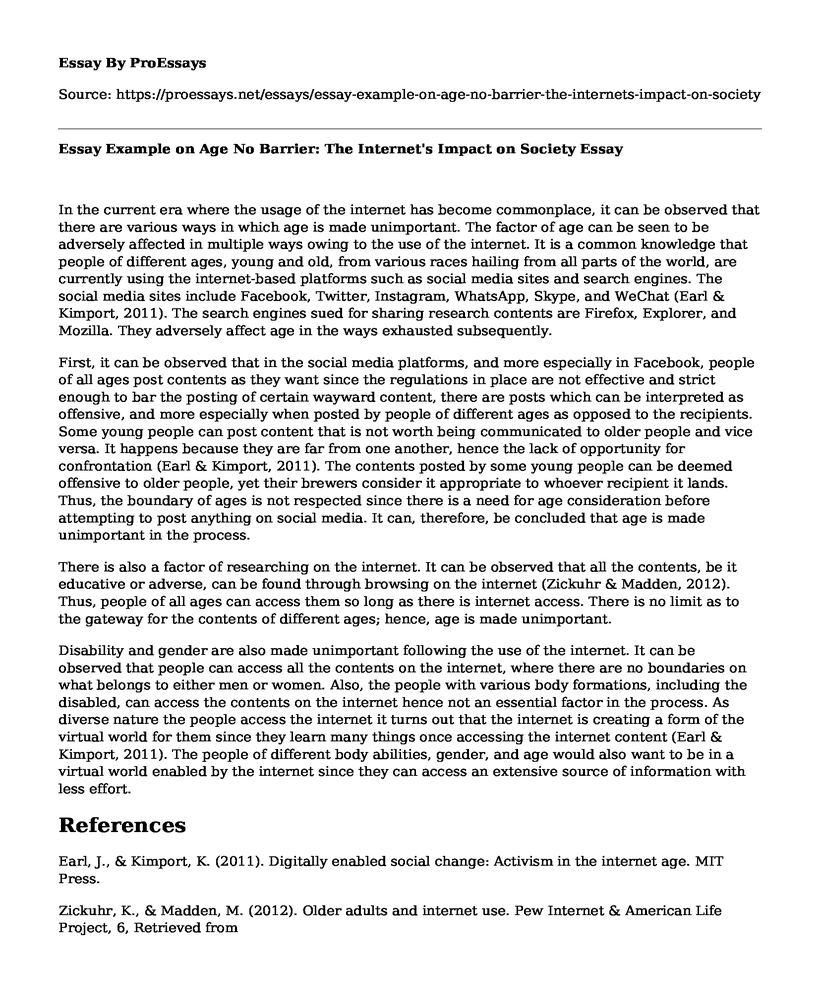In the current era where the usage of the internet has become commonplace, it can be observed that there are various ways in which age is made unimportant. The factor of age can be seen to be adversely affected in multiple ways owing to the use of the internet. It is a common knowledge that people of different ages, young and old, from various races hailing from all parts of the world, are currently using the internet-based platforms such as social media sites and search engines. The social media sites include Facebook, Twitter, Instagram, WhatsApp, Skype, and WeChat (Earl & Kimport, 2011). The search engines sued for sharing research contents are Firefox, Explorer, and Mozilla. They adversely affect age in the ways exhausted subsequently.
First, it can be observed that in the social media platforms, and more especially in Facebook, people of all ages post contents as they want since the regulations in place are not effective and strict enough to bar the posting of certain wayward content, there are posts which can be interpreted as offensive, and more especially when posted by people of different ages as opposed to the recipients. Some young people can post content that is not worth being communicated to older people and vice versa. It happens because they are far from one another, hence the lack of opportunity for confrontation (Earl & Kimport, 2011). The contents posted by some young people can be deemed offensive to older people, yet their brewers consider it appropriate to whoever recipient it lands. Thus, the boundary of ages is not respected since there is a need for age consideration before attempting to post anything on social media. It can, therefore, be concluded that age is made unimportant in the process.
There is also a factor of researching on the internet. It can be observed that all the contents, be it educative or adverse, can be found through browsing on the internet (Zickuhr & Madden, 2012). Thus, people of all ages can access them so long as there is internet access. There is no limit as to the gateway for the contents of different ages; hence, age is made unimportant.
Disability and gender are also made unimportant following the use of the internet. It can be observed that people can access all the contents on the internet, where there are no boundaries on what belongs to either men or women. Also, the people with various body formations, including the disabled, can access the contents on the internet hence not an essential factor in the process. As diverse nature the people access the internet it turns out that the internet is creating a form of the virtual world for them since they learn many things once accessing the internet content (Earl & Kimport, 2011). The people of different body abilities, gender, and age would also want to be in a virtual world enabled by the internet since they can access an extensive source of information with less effort.
References
Earl, J., & Kimport, K. (2011). Digitally enabled social change: Activism in the internet age. MIT Press.
Zickuhr, K., & Madden, M. (2012). Older adults and internet use. Pew Internet & American Life Project, 6, Retrieved from https://www.sainetz.at/dokumente/studien/Older_adults_and_internet_use_2012.pdf.
Cite this page
Essay Example on Age No Barrier: The Internet's Impact on Society. (2023, Feb 27). Retrieved from https://proessays.net/essays/essay-example-on-age-no-barrier-the-internets-impact-on-society
If you are the original author of this essay and no longer wish to have it published on the ProEssays website, please click below to request its removal:
- Minority Influence and Social Change Essay Example
- Ethical Business Dilemma Essay Example
- Sociological Analysis of "Mean Girls" Essay
- Essay Sample on Innovation in AIRBNB
- Attractive Relationship Alt. Impacts Early Cognition & Self-Protection - Essay Sample
- Teenage Single Parent: Struggling to Balance College and Parenthood - Essay Sample
- Essay Example on Katharine Graham: A Leader Embodying Self-Awareness and Relationships







